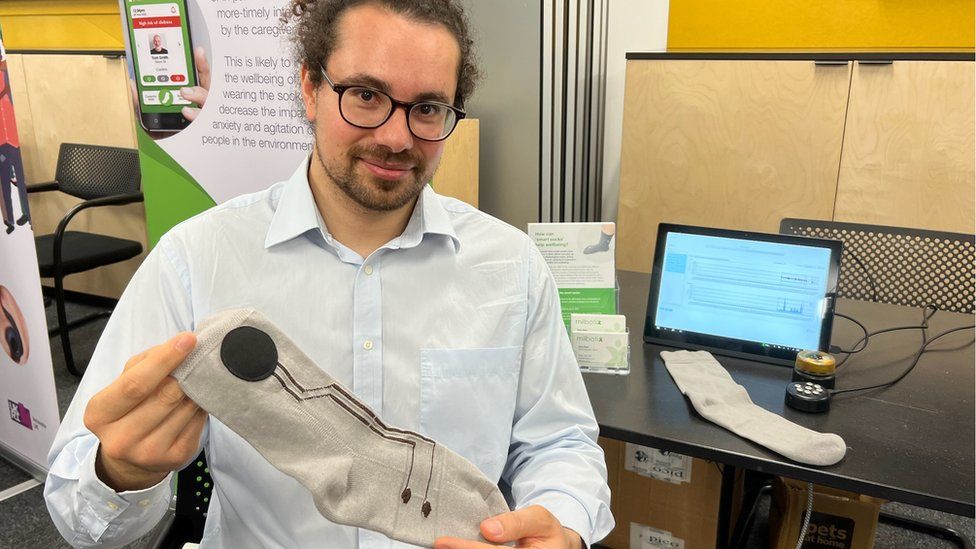
Socks to spot dementia, invented by Dr Zeke Steer
By Dave Harvey
Business and Environment Correspondent, BBC West
Socks that detect the early signs of Alzheimer’s Disease. A pregnancy test that blind women can use. And a holographic Barack Obama you can chat with.
These are some of the things you can find at Bristol’s technology festival. Dave Harvey has been for a look.
In a lab for tech start-ups, dozens of new ideas are being pitched, demonstrated and debated. One man says he has “re-invented the drone”.
And a woman has formulated the perfect probiotic drink for people with major bowel disorders.
This is the first event at Bristol’s technology festival. There will be 48 more, involving 5,000 people.
Dr Neciah Dorh is one. He is demonstrating his own health technology business, and is awed by the range of others.
Dr Neciah Dorh is developing tech to fight bacteria resistant to antibiotics
He said: “We’ve got everything from therapeutics to digital health, helping people with dementia, diagnosing infections, the next generation of vaccines.”
There’s a lot happening, to tackle the biggest problems our healthcare systems are facing.
Let’s start with the dementia socks. An intriguing idea, born out of a personal tragedy.
Zeke Steer watched his own great-grandmother decline into dementia, and wanted to help.
Spin forward a few years, and the research scientist has developed socks which detect early physical signs of the onset of diseases like Alzheimer’s.
“Sensors in our socks are detecting early signs of distress, and alerting a carer that they may need help,” he says.
Lightning Pitch: tech start-up had 90 seconds to explain their technology
The socks can measure heart rate, sweat, and other secretions.
“And everyone wears a pair of socks,” smiles Dr Steer, adding that they are more discreet than other wearable technology.
Next to him, researchers are working on electrifying lateral flow tests. The type of consumer health test made famous by Covid-19, the technology is also used in pregnancy tests and many others.
“But they rely on a visible line, as we all saw in Covid”, explains Paul Ko Ferrigno in a pitch to the room.
Remember those Covid conversations about whether the test line was “faint, solid, strong…”? The team at ‘eclateral’ team think they can do better than that.
They are now electrifying the kit, so that results are more precise, more quantifiable, more scientific.
“And most of all,” Mr Ferrigno adds, “it means a blind woman will be able to get her pregnancy test result directly, and discreetly.”
“Transformational Tech”, on show at the Festival, according to co-founder Ben Shorrock
This is the first big showcase of Bristol’s fourth Technology Festival. There will be debates on AI and disruptive tech.
Networking sessions with investors, pitching events for new start-ups seeking support.
Ben Shorrock is one of the co-founders and the chief exec of TechSpark.
“Bristol’s tech sector has grown fast,” he explains.
“From one or two start-up communities five years ago, there are now dozens of places like this, which has 40 companies in it alone.
“All are working on vital health technologies, new ways to cut carbon and save the planet, all transformational stuff.”
Back in the demo room, I’m chatting with Barack Obama.
Talk to the President: James Routley and his company’s AI Hologram of Barack Obama
The former US President jokes about how he met Michelle: “Way smarter than me, and I just knew this was going to be something”.
His golf game is “great, thank you sir”.
But when I ask which of his two children is his favourite, he scolds me: “As a good parent, I love each of my children unconditionally and equally, it’s not fair to pick favourites.”
Clearly I am not interviewing the actual Barack Obama.
I’m looking at a holographic image which shimmers and moves as its lips form the words it is speaking. The voice is pretty authentic.
The answers are crafted by an AI programme, scouring the internet to learn what President Obama “might say”.
“There is a lot about Barack Obama in the public domain,” explains James Routley.
He is one of the team at Bath-based tech firm Rocketmakers, who created the AI hologram they call ‘Portrait’.
“So our guy knows a lot of the interviews and profiles that are out there. We fed him a bit of personality as well, and this is the result.”
Uncanny
It is uncanny. Within reason, you can ask any question and President Obama replies.
His proudest achievement? The Affordable Care programme, also known as Obama Care.
Rocketmakers imagine their AI characters helping students in schools, or checking in airline passengers, where they can know all the latest delays and updates, training engineers on oil rig repairs, numerous other situations.
Like the other firms, this tech is at the early stage. Looking for customers, for investors, for problems to solve.
But Bristol is home to hundreds of these small start-up companies, employing some 80,000 people and earning over £1.5bn.
“It’s grown fast,” smiles Mr Shorrock, “and will only grow more now.”
Follow BBC West on Facebook, X and Instagram. Send your story ideas to: bristol@bbc.co.uk








